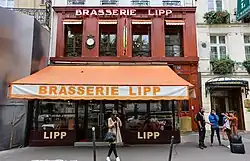Brasserie
In France, Flanders, and the Francophone world, a brasserie (pronounced [bʁas.ʁi]) is a type of French restaurant with a relaxed setting, which serves single dishes and other meals. The word brasserie is also French for "brewery" and, by extension, "the brewing business". Although most brasseries still serve a large selection of beers, most of them offer a wider choice of beverages such as wines and liquors.[1] A brasserie can be expected to have professional service, printed menus, and, traditionally, white linen—unlike a bistro which may have none of these. Typically, a brasserie is open every day and serves the same menu, generally composed of a few traditional French dishes, all day. A classic example of a brasserie dish is steak frites.[2]

.jpg.webp)

Etymology
The term brasserie is French for "brewery", from Middle French brasser "to brew", from Old French bracier, from Vulgar Latin braciare, of Celtic origin. Its first usage in English was in 1864.[3]
The origin of the word probably stems from the fact that beer was brewed on the premises rather than brought in: thus an inn would brew its own beer as well as supply food and invariably accommodation too. In 1901 Chambers's Twentieth Century Dictionary of the English Language defined "brasserie" as "in France, any beer-garden or saloon".[4] In 2000 The New Penguin English Dictionary included this definition of "brasserie": "a small informal French-style restaurant".[5]
Examples
Amongst the most renowned places considered to be brasseries, Bouillon Chartier is probably the most emblematic. Located in the 9th arrondissement in Paris, it was opened in 1896 by the brothers Frédéric and Camille Chartier. To this day, both locals and tourists visit this establishment, which is decorated in the Belle-Epoque style, to eat traditional and cheap dishes.[6]
The Closerie des Lilas, located in the 6th arrondissement, opened in 1847 and has been visited by many creatives such as Picasso, Jean-Paul Sartre, Oscar Wilde and Aragon for example.[7]
Other brasseries like Lipp and Café des Capucines have also become famous for the clients they have hosted.
See also
- La Mère Catherine (a Parisian brasserie founded in 1793)
- Gastropub
- Bistro
- Cafe
- Restaurant
References
- "Origine et histoire de la brasserie parisienne". Royal Opéra (in French). 2018-11-26. Retrieved 2023-02-07.
- Bourdain, Anthony (29 January 2002). "Childhood Favorites". A Cook's Tour. Season 2. Episode 9. 3 minutes in. Food Network.
I'm looking for the authentic and the familiar, some classic brasserie chow: steak frite.
- "Definition of BRASSERIE". Merriam-webster.com. Retrieved 1 December 2018.
- Davidson, Thomas, comp. Chambers's Twentieth Century Dictionary of the English Language. London: W. & R. Chambers; p. 113
- The New Penguin English Dictionary ; consultant editor: Robert Allen. London: Penguin, 2000; p. 167
- "L'histoire des cafés et grandes brasseries de Paris". Paris ZigZag | Insolite & Secret (in French). Retrieved 2023-02-07.
- REdaction, La (2021-10-19). "Les brasseries mythiques de Paris". Vivre Paris (in French). Retrieved 2023-02-07.